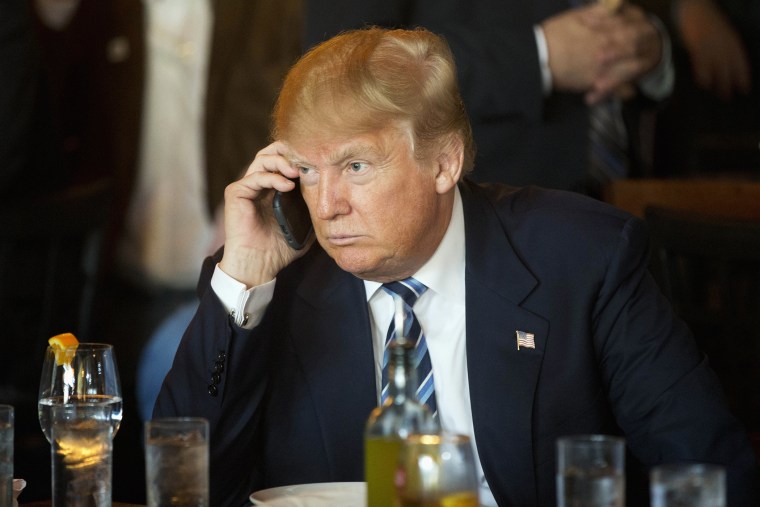White House National Security Advisor Michael Flynn's alleged talks with Russia in December are the basis for an important ongoing scandal. But the latest revelations also shed light on a separate, parallel controversy that may end up being every bit as important.
As part of its reporting on Flynn's communications with Russian Ambassador Sergey Kislyak, the Washington Post noted on Friday:
The talks were part of a series of contacts between Flynn and Kislyak that began before the Nov. 8 election and continued during the transition, officials said. [Emphasis added]
A New York Times report added:
[C]urrent and former American officials said that conversation -- which took place the day before the Obama administration imposed sanctions on Russia over accusations that it used cyberattacks to help sway the election in Mr. Trump's favor -- ranged far beyond the logistics of a post-inauguration phone call. And they said it was only one in a series of contacts between the two men that began before the election and also included talk of cooperating in the fight against the Islamic State, along with other issues. [Emphasis added]
It's hard to overstate the significance of this detail, which risks doing real harm to Donald Trump's White House.Let's back up a minute to provide some context.Practically everyone in both parties now agrees that Russian officials, acting on Vladimir Putin's orders, launched an espionage operation to undermine the U.S. presidential election in 2016, at least in part to help put Trump in the White House. What's unclear is whether Team Trump colluded with Moscow during the election crimes.On Nov. 10, just two days after the U.S. election, Russian Deputy Foreign Minister Sergei Ryabkov said "there were contacts" between the Russian government and Trump's campaign team before the U.S. presidential election. In fact, Ryabkov said "quite a few" members of Trump's team had been "staying in touch with Russian representatives" before Americans cast their ballots.Trump World have long insisted the opposite was true. Kellyanne Conway, asked if there were pre-election communications between the Republican campaign and Putin's government, said, "Absolutely not." She added the conversations "never happened" and any suggestions to the contrary "undermine our democracy."Though it's unclear why the Russian deputy foreign minister would lie about this, Conway wasn't the only member of Team Trump who emphatically denied the talks. At a pre-inaugural press conference, the president himself said no one from the Trump campaign was in contact with Russia during the campaign.Those denials are apparently in conflict with the findings of U.S. intelligence agencies.Why is this so important? Because we're faced with the very real possibility that a foreign adversary attacked America's democracy to help put Donald Trump in the Oval Office, and while those attacks were under way, Trump aides were in communications with Putin's government and then Team Trump repeatedly misled the American public about what transpired.Based on what's been reported thus far, that's precisely what happened.Postscript: The idea that no one on Team Trump spoke to Putin's government before the election was already suspect. One of the people Trump singled out as a top foreign policy advisor, Carter Page, had repeated contacts with Moscow during the campaign -- right up until Team Trump decided to disown Page and pretend he had no role in the operation.That said, Michael Flynn is a far more prominent, more powerful, and more influential figure in the president's orbit. If the White House national security advisor was also engaged in pre-election talks with Putin's government during the campaign, it's a qualitatively more important revelation.Second Postscript: The list of questions for the White House isn't short, but I'd start with, "What did Trump know about Flynn's pre-election communications with Russia? When did the president first learn of the back-channel messages? If Trump didn't know what his top national security advisior was up to for months, what does that say about the president's ability to lead? And if he did know, why did the president lie to the public?"
